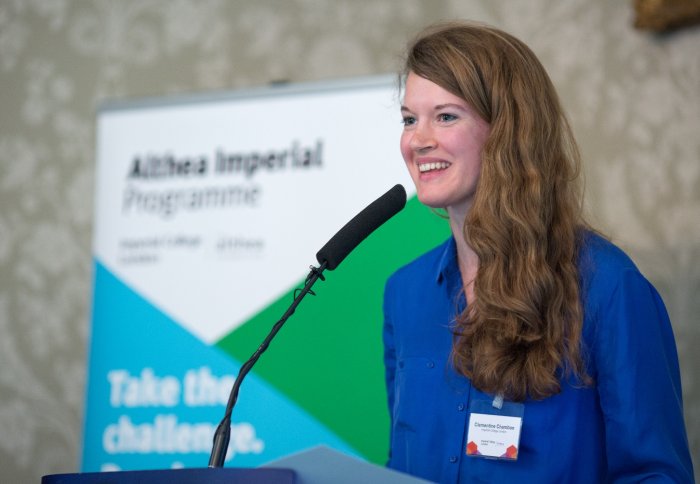Q&A with Althea runner up Clementine Chambon

Althea runner-up Clementine talks about coming up with new ideas and the need for business and research to work together.
Can you tell me a little about how you came up with the idea and what convinced you that there was real business potential there?
The idea for Oorja was conceptualized during the Climate-KIC ‘Journey’, a summer school which aims to develop the next generation of climate entrepreneurs, in August 2014. My co-founder Amit Saraogi, a social entrepreneur from India, proposed using rice husks and other locally available crop wastes to generate energy for underserved communities. We explored ways to create value from crop waste, pulling on our team’s strengths in biofuel production, pyrolysis and combustion engines, to design an efficient, multi-component unit that would co-produce renewable and affordable energy and biochar. Biochar is a natural soil amendment that improves soil fertility soil amendment and is also a form of carbon sequestration. We settled on India to start up our initiative given that it has a huge underserved population starved of energy and faces other climate-related threats that we could address, such as food and water security and soil degradation.
We then developed an innovative and highly scaleable business model to distribute our products and services to off-grid rural agrarian communities in India through decentralized plants owned and operated by micro-franchisees. We expect this initiative, if implemented, to have a vast impact – both socio-economic and environmental with substantial reduction in greenhouse gas emissions. The enormous demand for energy and urgent needs to develop climate-resilient agriculture across rural India, as well as Amit’s experience on the field working with UNICEF, convinced us that there was real business potential.
What are your thoughts on entrepreneurship in science – is it a good thing for scientists to be hooked into the business world?
Entrepreneurship presents a fantastic opportunity for scientists and engineers to create immediate impact using their innovative ideas. Breakthroughs in the lab usually take decades to be translated into real life and commercialised, but entrepreneurship provides a disruptive way to bring innovation to the market faster. This is by nature a risky profession, and many entrepreneurs do not succeed on their first venture, but the experience of failure can feed back into research to help guide innovation. Regardless of one’s ambitions, an entrepreneurial mind-set is very powerful to help researchers see opportunities in innovation. Entrepreneurial scientists have a keen understanding of how business sectors work, how to secure finance and investment and to oversee the development of innovation processes. Ultimately the world needs both scientists in research, pushing back the boundaries of knowledge and revolutionising their chosen fields, as well as entrepreneurial scientists who commercialise these ideas, to create lasting change.
How did it feel to be shortlisted and how have you found the whole process?
I was thrilled to be shortlisted and to represent our team, Oorja, in the Althea-Imperial finals. The Althea Programme has allowed me to fully appreciate and leverage the opportunities at Imperial for entrepreneurially-minded students. Throughout this year I have become aware of the vast networks available to students wishing to translate their research into high-impact business ventures, including Imperial Create Lab, the Entrepreneurship Hub, IE&D Projects, Imperial Innovations and Climate-KIC, to name only a few! It has also been thrilling to meet female students also engaged in both academia and entrepreneurship, and this has been highly motivational in giving me new role models who are using an entrepreneurial approach to realise their ambitions. Being shortlisted was the cherry on the cake and I am excited to present our venture to an investor panel.
What does the future hold?
We are currently in the process of finalising a small-scale product prototype, which is being developed together with a team of undergraduate students in Mechanical Engineering. Our team is currently raising funds for the construction of a full-scale plant prototype to be deployed and tested in Uttar Pradesh, India, our pilot location.
Our initiative will use rice husk and other abundant crop waste which can be found locally, so India is a crucial target market due to its thriving agricultural sector and huge underserved population living on less than $2/day. We have chosen Uttar Pradesh, a densely populated state with millions living at the ‘bottom of the pyramid’ that are underserved, as our pilot location. In Uttar Pradesh over 70% of households lack access to electricity, the state is the biggest producer of crop wastes and farmers face serious soil degradation problems.
Next week [April 2014] we will be visiting Uttar Pradesh to undertake customer validation, energy demand analysis and meet key stakeholders including farmers, rice mill owners and household representatives. We will use this field visit to identify a suitable pilot village, develop partnerships and raise seed capital to finance the business launch in early 2016.
Article text (excluding photos or graphics) © Imperial College London.
Photos and graphics subject to third party copyright used with permission or © Imperial College London.
Reporter
Andrew Czyzewski
Communications Division